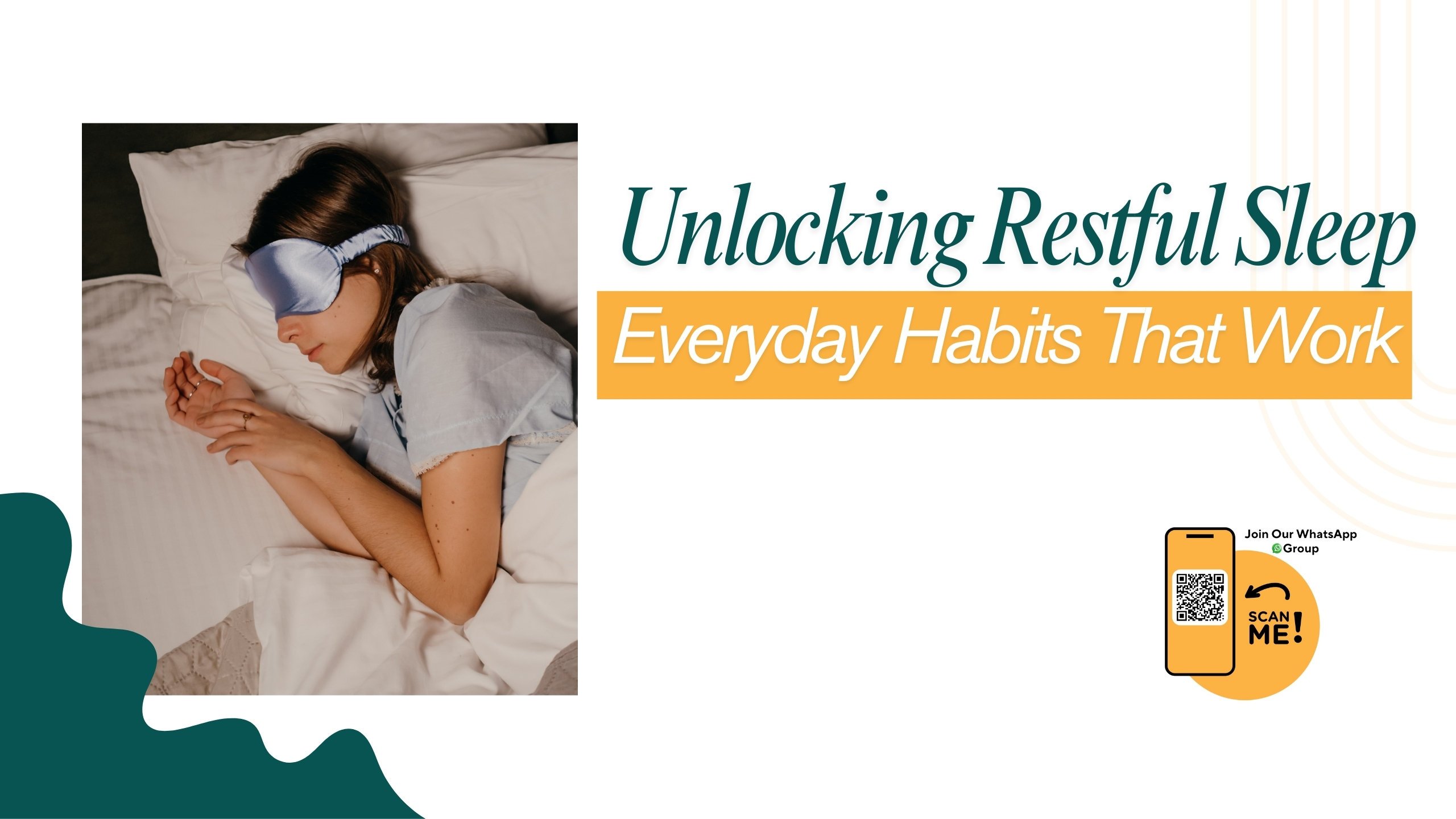We all juggle busy lives, work, family, errands, and endless notifications and often treat sleep as optional. In reality, quality sleep is not a luxury, but a biological necessity. While you rest, your body rejuvenate: repairing tissue, balancing hormones, consolidating memories, and resetting metabolism. Good sleep is the foundation for mood stability, focus, energy, and long-term health.
The challenge? Modern lifestyles, late-night screen time, irregular eating, shift work, travel, and stressoften sabotage our ability to sleep well. The good news is that by practicing simple habits, collectively known as sleep hygiene, you can train your body and mind to welcome truly restful nights.
What Is Sleep Hygiene and Why It Matters?
Sleep hygiene refers to routines and conditions that set the stage for high-quality sleep. Think of it as sleep’s “support system”: behaviours and environments that help your brain and body recognize it’s time to wind down.
When practiced consistently, sleep hygiene:
- Aligns your body’s internal clock (circadian rhythm).
- Improves sleep quality and duration.
- Enhances focus, energy, and emotional balance during the day.
- Reduces risks of insomnia and fatigue-related health issues.
- Supports long-term health by lowering risks of obesity, hypertension, diabetes, and even cognitive decline.
Practical Tips for Better Sleep Hygiene
Here are science-backed ways to improve your sleep:
- Stick to a consistent schedule: Go to bed and wake up at the same time every day, even on weekends. Regular timing reinforces your body’s natural rhythm.
Note for shift workers: Consistency still helps, even if your “night” falls during the day. Try to keep your sleep/wake times steady across workdays and off-days as much as possible.
- Create a sleep-friendly bedroom: Keep your room cool, quiet, and dark. Block out noise with earplugs or white noise and use blackout curtains or an eye mask to block daylight if you’re sleeping after a night shift. A supportive mattress and pillow are investments in your health.
- Wind down with a routine: About an hour before bed, dim the lights and do calming activities: read, stretch gently, or practice breathing exercises. Avoid screens, as their blue light delays melatonin release and tricks your brain into “daytime mode”.
- Use the bed only for sleep and intimacy: This trains your brain to associate bed with rest. Avoid using it for work, studying, or endless scrolling.
- Watch your food and drinks: Heavy or spicy meals close to bedtime can cause indigestion or reflux. Stimulants like caffeine and nicotine delay sleep onset, while alcohol disrupts deep sleep later in the night. Aim to finish your last coffee at least 8 hours before bed. If you need a snack, choose something light like yogurt, a banana, or a handful of nuts.
Tip for travelers with jet lag: Time your meals to match the new time zone. Eating in sync with local daytime hours helps reset your circadian rhythm faster.
- Move your body wisely: Regular physical activity, walking, yoga, swimmingimproves sleep. Just avoid intense workouts right before bed, as they raise alertness and body temperature.
- Harness natural light:Exposure to morning sunlight anchors your circadian rhythm, improving alertness by day and sleepiness at night. Balance it out by dimming lights in the evening.
Note on jet lag: Bright light is the most powerful tool to reset your body clock. Morning sunlight helps when traveling eastward; evening light works better for westward travel.
- Manage stress before bed: Worries often peak when you hit the pillow. Try journaling your thoughts or tomorrow’s to-do list to clear your mind. Meditation, light music, or breathing exercises can calm your nervous system for smoother sleep.
Other Overlooked but Crucial Factors
- Napping: Short naps (20–30 minutes) can boost alertness without harming nighttime sleep. Long or late-afternoon naps, however, may make it harder to fall asleep at night. Shift workers can use short naps strategically to fight fatigue.
- Temperature regulation: The body naturally cools down before sleep. A warm shower or bath 1–2 hours before bed can help trigger this process, making it easier to drift off.
- Hydration balance: Stay hydrated during the day but avoid drinking large amounts right before bedtime to reduce bathroom trips that disturb sleep.
- Noise and soundscapes: Beyond earplugs, soothing sounds (like gentle music, nature sounds, or white noise) can mask disturbances and help signal the brain to relax.
- Clock-watching trap: Constantly checking the clock when you can’t sleep increases anxiety and makes it harder to nod off. If you’re awake for more than 20 minutes, get up and do something calming in dim light, then return to bed when drowsy.
- Chronotypes (morning larks vs. night owls): People naturally differ in sleep timing preferences. While sleep hygiene helps everyone, routines should be personalized, forcing yourself into the “wrong” schedule may do more harm than good.
The Hidden Toll of Late-Night Eating
One of the most overlooked sleep disruptors is eating too close to bedtime. Here’s why it matters:
- Digestive distraction: Instead of focusing on repair and recovery, your body is busy digesting.
- Hormonal disruption: Eating late interferes with blood sugar regulation and melatonin release.
- More awakenings: Nighttime snacking increases the chances of waking up mid-sleep.
- Reflux risk: Lying down soon after a meal raises the risk of heartburn and discomfort.
- Best practice: Finish dinner at least 2–3 hours before bed. If hunger strikes later, choose a light snack rather than a heavy or spicy meal.
- Shift work tip: If you’re eating on a night shift, keep meals lighter and avoid heavy, high-fat foods during the hours you’d normally be asleep. This reduces digestive discomfort and helps your body clock stay more stable.
When to Seek Professional Help
Sometimes, persistent sleep problems point to underlying conditions. If you struggle to sleep well at least three nights a week for several weeks, or if you experience symptoms like loud snoring, choking in sleep, or excessive daytime sleepiness, consult a healthcare professional. Disorders such as insomnia, sleep apnea, or restless legs may require specific treatment.
Sleep Hygiene Essentials Checklist ✅
- Go to bed and wake up at the same time daily (adapt this if you work shifts).
- Keep your bedroom cool, quiet, and dark; use blackout curtains if needed.
- Use your bed only for sleep and intimacy.
- Establish a wind-down routine (reading, stretching, dim lights).
- Avoid screens 30-60 minutes before bed.
- Finish dinner 2-3 hours before sleep; keep late snacks light.
- Avoid caffeine, nicotine, and alcohol close to bedtime.
- Stay active during the day butskip intense exercise right before bed.
- Take a warm shower or bath 1–2 hours before bedtime to help your body cool down and prepare for sleep.
- Get morning sunlight; manage evening light if adjusting to travel or shift work.
- Manage stress with journaling, meditation, or relaxation exercises.
- Limit long or late naps; keep them short and strategic.
- Avoid clock-watching if you can’t sleepget up briefly and return when drowsy.
Small Changes, Big Sleep
Improving sleep doesn’t require an overhaul but just consistent, small steps. Start by dimming screens 30 minutes before bed, writing down your worries, or stepping outside for morning sunlight. Then add more changes over time.
Good sleep hygiene is less about perfection and more about persistence. The reward? Better energy, sharper focus, stronger immunity, and a brighter mood.
Tonight, try one change. Tomorrow, notice how you feel. Over time, these small shifts can transform your nights into deep restand your days into your best.

Written by Dr Yadhushree P V

